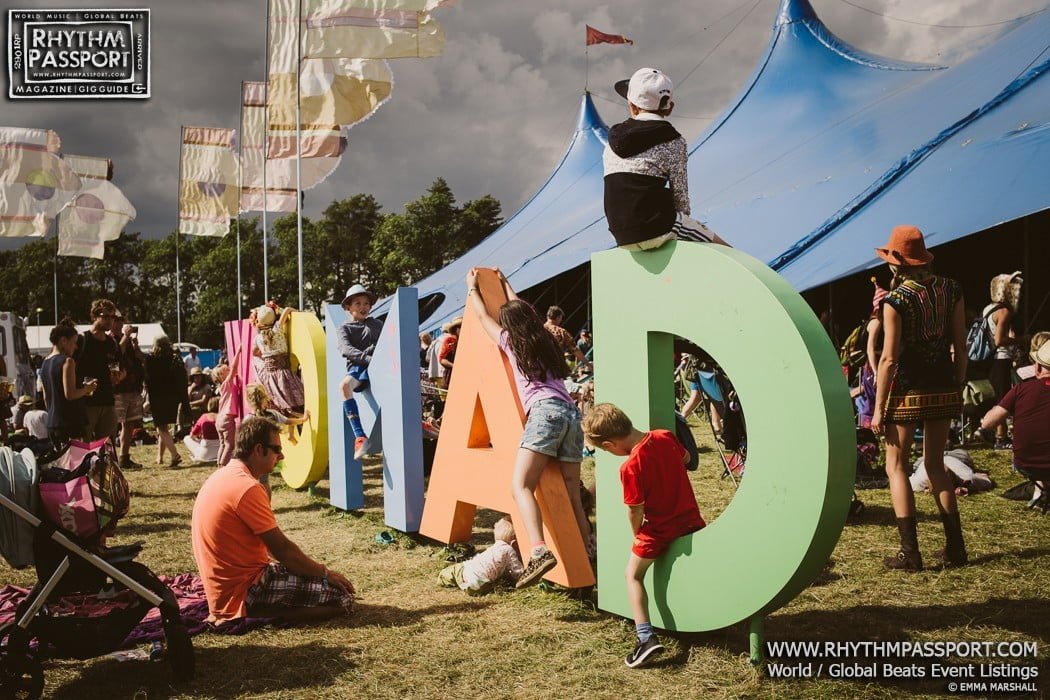This year, we only got a glimpse of the music bonanza offered by the Womad UK weekend. Our stay in Malmesbury consisted of a hit-and-run or a ‘toccata-and-fugue’, in-keeping with the musical topic, and saw us pay a visit to Charlton Park on the last day of the event.
Still, we enjoyed a bellyful of tasty, quality and suggestive sounds, next to some layers of mud on our wellies – due to the intermittent rain and inevitable stage-hopping.
When you think that you’ve seen and listened to them all, Womad will always be there ready to surprise you one more time. We were indeed spoilt for choice since the early afternoon on the conclusive day of the 2017 edition.
In front of the BBC Radio 3 Charlie Gillett stage, King Ayisoba gathered together many dedicated and rain-dancing fans to enjoy his organic North Ghanaian Kologo. Under the Siam Tent, Noureddine Khourchid & the Whirling Dervishes of Damascus brought their uplifting Sufi melodies, enriched by mystic and spellbinding dance moves, directly from the torn-apart-by-war Umayyad Mosque in Damascus.
From there on, it became quite clear that the last hours of the Festival were also going to be a “spiritual” experience as well as a musical one.
After those Syrian Sufi rituals, Benjamin Zephaniah and The Revolutionary Minds showed their audience how to be effective and thought-provoking urban preachers, thanks to their straightforward metrics and hip-hop and dub vibes.
The almost metaphysical character of the programme became even more emphasised by ÌFÉ’s gig in the lush backdrop of the Ecotricity Stage. The white-dressed Puerto Rican musicians, led by Otura Mun, are indeed Santeria devotees, and their credo is embodied in their music. The Afro-Caribbean and Latin roots of their sound are adorned by their refined and rarefied electronic arrangement, which is able to guide their listeners in an uplifting and rhythmic musical ceremony.
Meanwhile, there was another kind of devotion displayed by Msafiri Zawose. Since an early age, the Tanzanian musician has dedicated his life to the Ilimba (Tanzanian thumb piano) and today, he is one of the most renowned and original interpreters of the Gogo tradition. His one-man-show (Msafiri also plays the zeze, kalimba, flute and Ngoma drum) was a journey through some of the most authentic traits of Eastern African music.
To keep up with the ritualistic mood, a few minutes after the end of Msafiri Zawose’s gig and just a few steps away, Womad’s Main Stage audience could luxuriate themselves in a musical bacchanal. Chilean group Chico Trujillo didn’t spare any effort in letting people dance and inebriate themselves with their intoxicating and original new Cumbia and upbeat versions of traditional songs like “La Fiesta de San Benito”, “La Pollera Amarilla” and “La Medallita”.
We closed our “otherworldly” Womad 2017 adventure with a show that can be easily described as the epitome of the day. Ariwo’s performance was indeed the perfect sum of Middle Eastern (and Sufi hints) electronic melodies assembled by the Iranian sound wizard Pouya Ehsaei, with organic Afro-Latin notes (and Santeria imagery) played by Cubans Yelfris Valdes (trumpet), Oreste Noda (congas) and Hammadi Valdes (drums and percussion).
It wasn’t “simply” about the talent of the four musicians on stage, but how their sound could envelop and elate the crowd. Their prolonged and ethereal compositions, built on electro-soundscapes, precise trumpet solos and dilated percussion and drum beats, have the ability and intensity to detach their listeners from reality.
Which is also what Womad has been able to do every year since 1982. For a weekend in July, Womad-goers can be sure that they can take a break from their everyday life and immerse themselves in an uplifting music experience.


